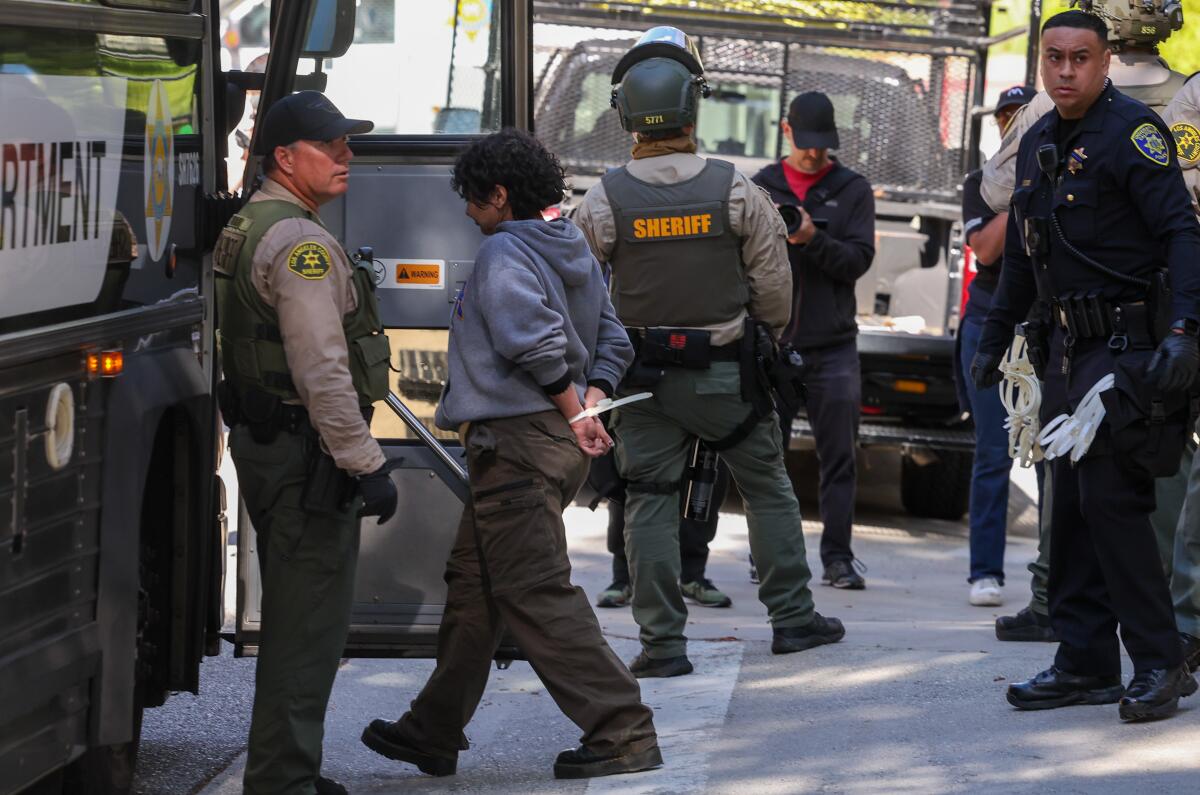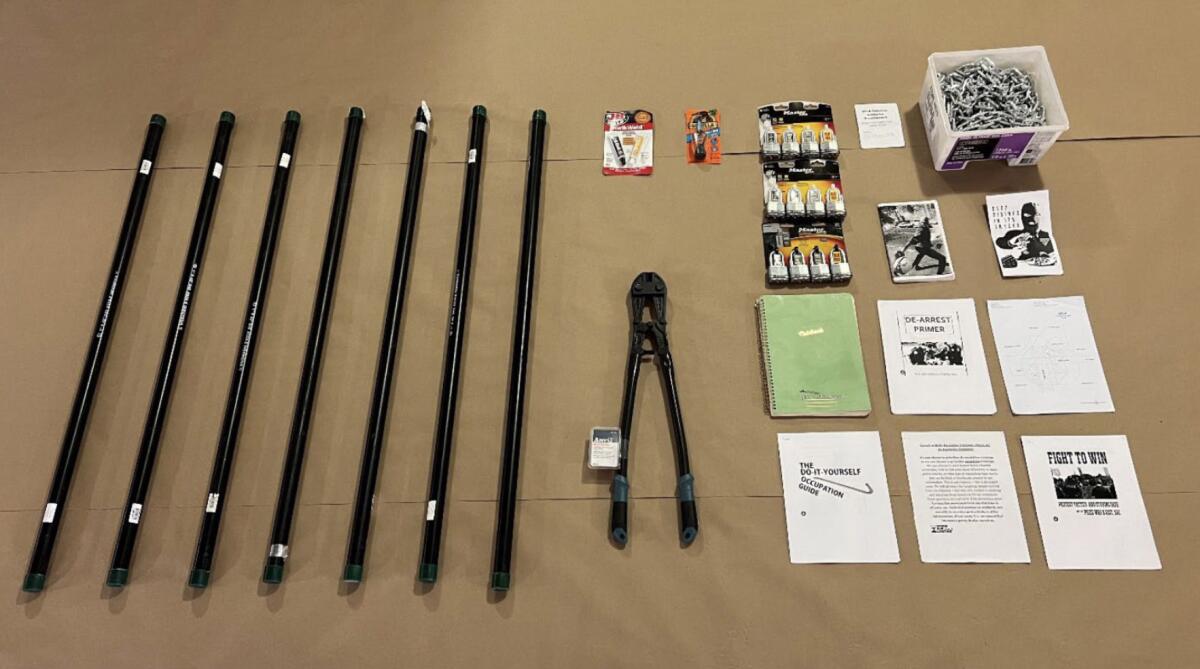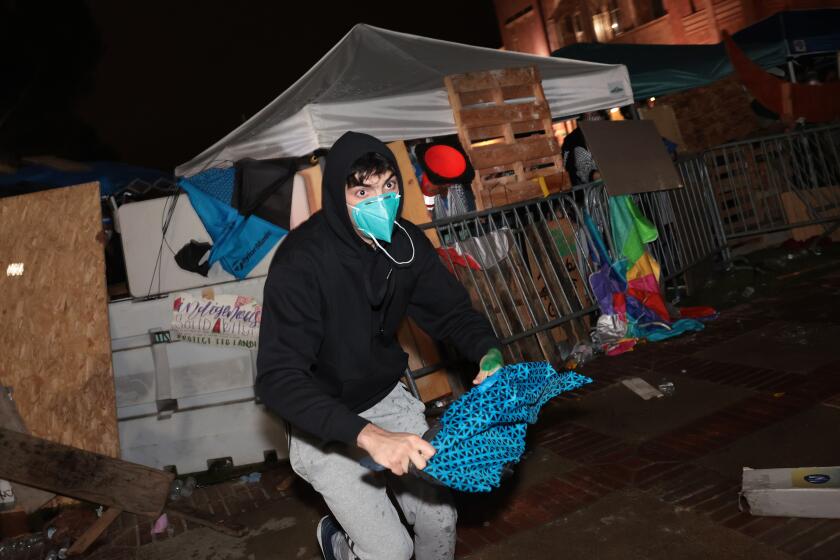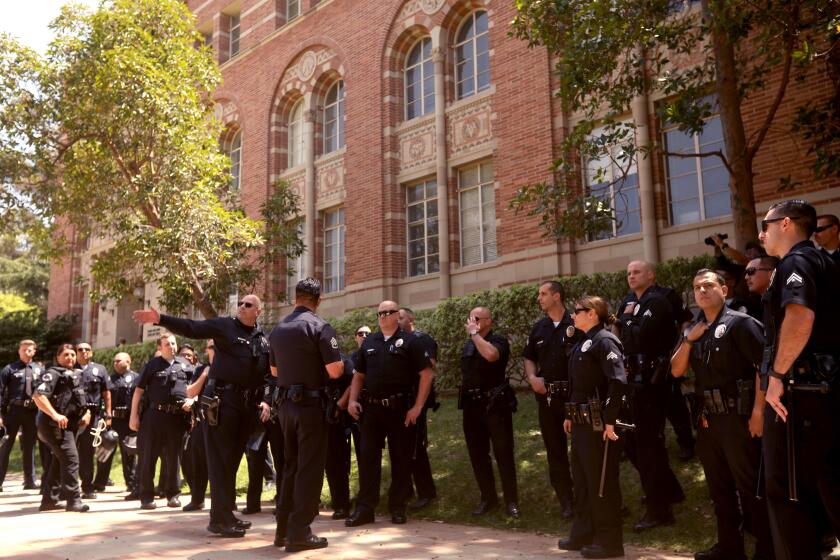UCLA alleges protesters arrested Monday had tools to barricade buildings

- Share via
UCLA police say protesters arrested Monday at a university garage had materials that could be “used to unlawfully enter and barricade a building.”
In a news release Wednesday, campus police said some of those arrested had “heavy-duty metal pipes, bolt cutters, epoxy adhesive, super glue, padlocks [and] heavy-duty chains,” as well as literature “encouraging vandalism and violence.” Police said they’d seized a copy of the “The Do-It-Yourself Occupation Guide.”
UCLA has faced criticism for the arrests of the 44 pro-Palestinian protesters — 35 of whom, according to police, were students. Participants said they were gathering for a peaceful protest. Some called the actions by police harassment and intimidation.
Those who were arrested Monday were escorted from the parking garage to an L.A. County Sheriff’s Department bus. Police said four of the group had also been arrested May 2, when more than 200 people were taken into custody at the encampment outside Royce Hall, which police dismantled.

There was at least one independent journalist arrested. He said he was booked on conspiracy to commit burglary, despite initially being stopped — and let go — by officers who said he was violating a curfew for people unaffiliated with the university. He disputed that he engaged in any unlawful behavior.
None of those arrested have been formally charged with a crime, and UCLA has not specified who had the items in their possession.
The arrests capped days of upheaval at UCLA, including a mob attack on the pro-Palestinian encampment late the night of April 30.
Los Angeles Mayor Karen Bass on Wednesday compared the attack on the camp to the Jan. 6 attack on the U.S. Capitol, saying it “came out of nowhere.”
Shortly before 11 p.m. that night, a large pro-Israeli group arrived on the Westwood campus and attacked pro-Palestinian protesters.
The mob ripped down barricades, hurled objects, launched fireworks and sprayed mace, injuring several at the encampment, which had been standing outside Royce Hall since April 25.
No one has been arrested in the attack. UCLA police are working with the Los Angeles Police Department and the FBI to identify the assailants.
Here is what we know about the last couple of weeks on campus, based on interviews, recordings, social media and documents.
“Frankly, it reminded me of Jan. 6,” said Bass, a former member of Congress who was at the Capitol complex when rioters stormed the government building in January 2021.
Bass has previously spoken in emotional terms about Jan. 6, calling it a tragedy that threatened the lives of journalists, emergency responders and others.
Speaking about the level of coordination of the attack, Bass said she had “no idea,” although she said she didn’t “think that however many people just all woke up at the same time and decided to go to UCLA.”
Monday’s arrests followed avowals by UCLA officials to improve security after the April 30 violence. UCLA’s police chief, John Thomas, has faced growing scrutiny after a string of serious security lapses surrounding the incident. Thomas had assured university leadership he could mobilize law enforcement in minutes, according to three sources who were not authorized to speak publicly. The attack, however, spun out over several hours before law enforcement took control.
Just days before, Thomas had been asked to create a written safety plan as tensions on the campus skyrocketed, but he never did it, according to the sources.
Bass declined to weigh in on Thomas’ actions and whether he should resign, saying that it is a university issue.
Five days before pro-Israeli counterprotesters attacked a pro-Palestinian camp, UCLA police asked other campuses for additional help, then canceled the requests.
When the initial fight broke out, only six UCLA police officers were at the scene, and they were heavily outnumbered. Bass said that, based on what she knew, she believed the LAPD responded appropriately.
In a televised interview with Fox 11, the mayor appeared to criticize the university for its lack of a plan.
“So calling a local [police] station while a protest is happening is not going to generate 80, 90, 100 police officers in a matter of minutes. Unfortunately, it took hours,” Bass said. “I learned in this process that if you’re going to have a big problem like that, you have to notify law enforcement in advance so they can muster the troops.”
UC President Michael V. Drake has ordered an independent investigation led by Philadelphia’s former police chief.
Thomas has said he advised UCLA’s leadership from the beginning not to allow the encampment because it violated campus rules and he feared it could lead to escalating problems.
The chief said he developed a response that relied on private security and made sure to alert the LAPD if problems arose. He acknowledged that he did tell others it would be only minutes for a response, but said he was referring to a general response, not a force large enough to handle the melee that unfolded.
Thomas told The Times when a problem broke out, UCLA’s leadership authorized him to request mutual aid. But he said the LAPD told him there was a problem with the payment system between the city and the state so the arrangements “couldn’t be done by the time of the attack.”
The UCLA police chief is facing scrutiny for what three sources told The Times were serious security lapses before a mob attacked a pro-Palestinian student encampment. He rejects the claims.
On Wednesday, Bass rejected the notion that there was “some payment delay” to the LAPD and that the police force withheld service.
“That is absolutely false,” Bass said. “LAPD was not notified in time. And so when the request was made of LAPD — I don’t remember the exact time, but it was between 11 and 11:30 — I believe the attack had already been well underway.
“LAPD did not have the capacity on such short notice to mobilize full force,” the mayor said.
Bass said she returned early from Washington, D.C., early the morning after the attack after speaking on the phone with UCLA Chancellor Gene Block and LAPD Interim Chief Dominic Choi.
Bass, in the Fox 11 interview, also questioned why the university allowed the counterprotest to take place next to the pro-Palestinian encampment, which had been largely peaceful until then.
More to Read
Sign up for Essential California
The most important California stories and recommendations in your inbox every morning.
You may occasionally receive promotional content from the Los Angeles Times.



















